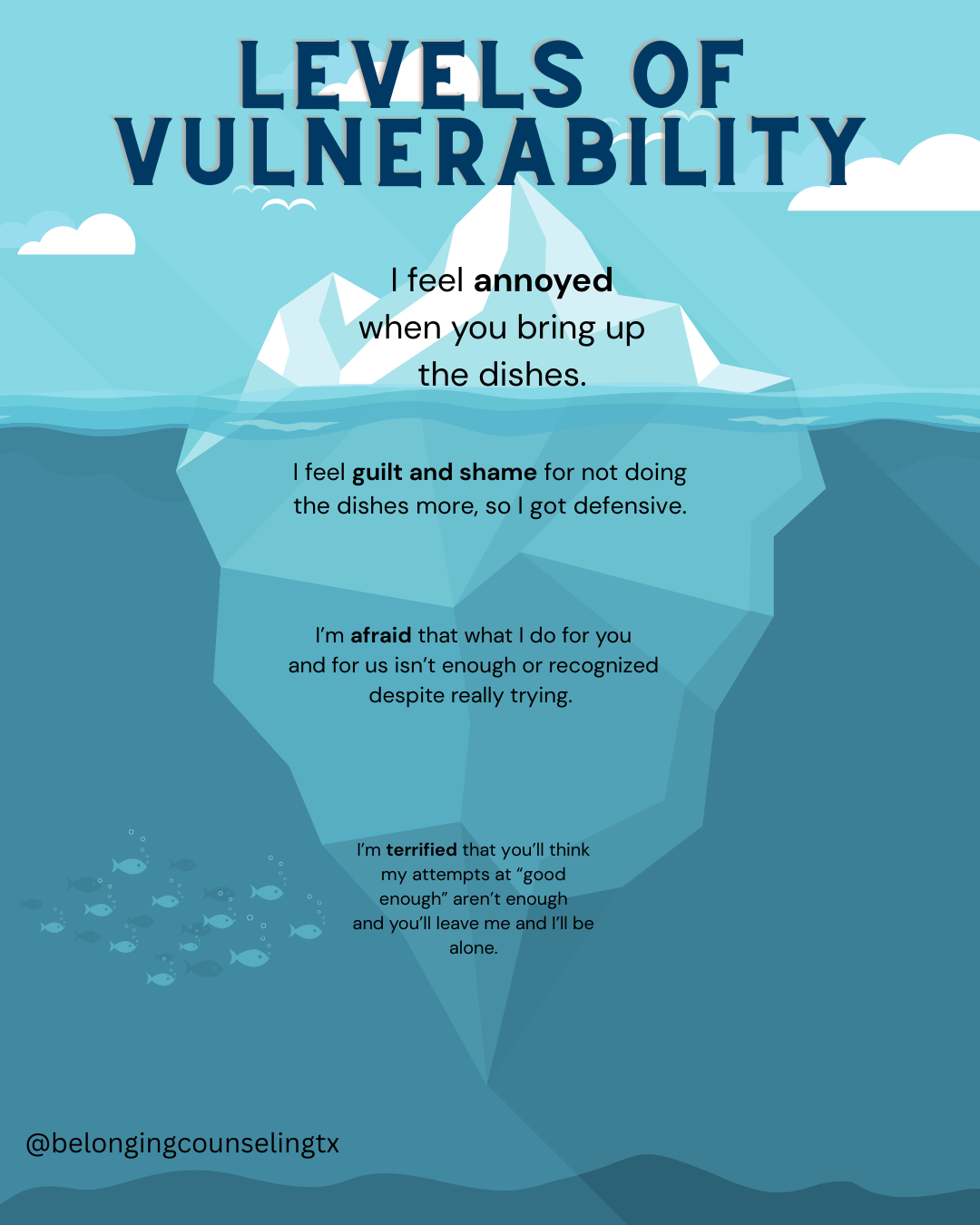Being Vulnerable in Your Relationship
People like to see others be vulnerable–it makes us feel like they’re being open, transparent, and honest with us. And if they’re open and honest, it makes us feel safe, secure, and trusting. This is why most of us desire to have partners who can be vulnerable–it helps us feel closer to them. But for us to be vulnerable? To risk being the first ones to admit our deepest insecurities and fears in a relationship? “Umm…no thanks.”
There are so many levels of vulnerability and limits to how deep we’ll go with someone. So, to be on the same page, let’s define vulnerability.
How should we define vulnerability?
Take a moment to reflect on your definition of vulnerability? What does it look like for you? And what does it look like in a relationship? Personally, I like Brené Brown’s definition of vulnerability:
Vulnerability is risk, uncertainty, and emotional exposure.
To be vulnerable, we don’t technically know what’s going to happen—but we say or do the deep thing anyway—regardless of the possible outcome. And in a relationship, it’s about being open with our partners about our deepest feelings and thoughts. (Cue the sound of thunder in the background.)
And there’s levels to the vulnerability and depth we share with someone. Below, I give an example of a couple who has an argument over dishes. If the argument were truly only about the dishes, the argument would last a short time and have fleeting emotions. But if the argument is about more, it tends to last longer and have more emotional impact.
Partner A Partner B
I like the metaphor of an iceberg because icebergs are bigger than meets the eye. Over the surface, it’s a big rock of ice; but underneath, it’s a skyscraper. This is the same with our thoughts and feelings. More times than not, when we feel strongly about something, there’s more than meets the eye. And if a couple is used to only sharing what’s over the surface, they miss out on such depth and richness. They miss out on knowing how deep it truly goes for their partner and connecting to and understanding that.
The iceberg above is just one example. But you might find yourself thinking/feeling something different. What would you find down the iceberg of your arguments?
The Difficulty of Vulnerability
Perhaps sharing the surface-level iceberg message is already very vulnerable for you or your partner. That’s okay. Let’s acknowledge that. I’m not here to make anyone feel bad about their relationship with vulnerability. It’s all normal.
To some, going that deep down the iceberg is manageable. Perhaps they grew up with caregivers who taught them that vulnerability is important and valuable. They may find it easier to be vulnerable because they have people and experiences that have consistently taught them:
It’s okay if you go there with me.
I will hear you out and take you seriously so you can trust me.
Your thoughts and feelings matter to me and I’ll respond with understanding and empathy.
To others, vulnerability is nails on a chalkboard. Perhaps they grew up with caregivers who taught them it’s weakness and dangerous. They may find it harder to be vulnerable because they have people and experiences that consistently taught them:
I (or “we” in family norms) don’t talk about those kinds of things (feelings) so don’t bring them up.
I will respond harshly if you show emotion, so you learn to distrust me with those things.
Your thoughts and feelings should be handled this other way (shoving them down, covering them with anger instead, letting them fester, smile and pretend everything’s ok, etc).
Sometimes, our caregivers don’t teach us anything about this—we just learn by observing and learning the norms in our families. And sometimes, we experience other relationships in our lives (with friends, teachers, bf/gf/o) that teach us a mix of these lessons. All of this is on a spectrum and can look different from person to person. This is part of understanding attachment theory (more on that in another post).
What did your family teach you about vulnerability? How do you think it’s impacting your relationship?
Differing Capacities for Vulnerability
You are in a relationship in which you both bring your relationship history (family, friends, romantic, etc.) to this relationship. If you’re having a hard time seeing eye to eye in conflict or in intimate conversations, it may be due to your differing views/capacities on vulnerability.
I would say that true vulnerability adds to the intimacy, safety, and security of our relationships. So even if it’s difficult for us (or veeeeerrryyy difficult), the good news is that it’s possible to change our relationship with vulnerability. And if we commit to changing that together, we can change the connection we feel in our relationship with our partners and spouses. It’s possible (albeit tricky) to do that work just between you two with a mix of research, reflection, and lots & lots of communication. But if you find yourself needing more guidance and support with a nonjudgemental, unbiased third party—consider couples therapy.
If you find yourself needing support in “going deeper down the iceberg” of your relationship, consider checking out a couples therapist who specializes in EFT (Emotionally Focused Therapy). At Belonging Counseling, we specialize in EFT. If you’re interested in doing that work as an individual, we also specialize in issues around vulnerability. Reach out and schedule a consult with us today!
At Belonging Counseling, we offer individual and couples therapy in Austin, TX. Interested in services? Contact us here.


